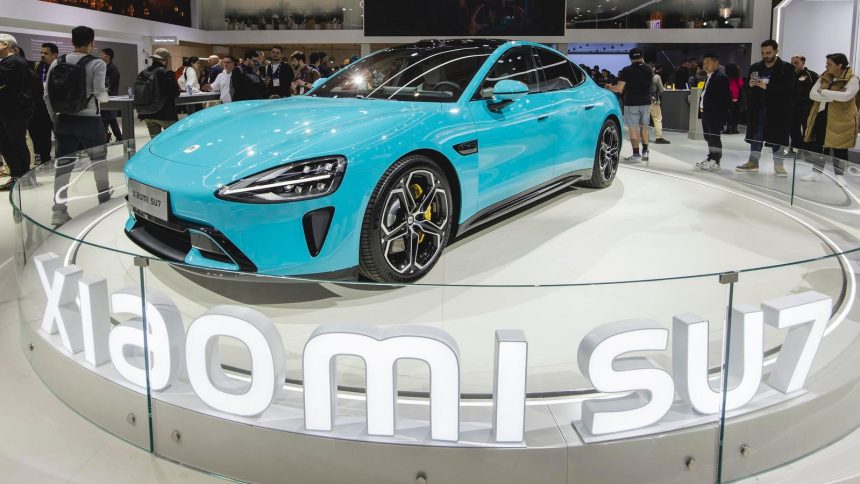China’s meteoric rise in the electric vehicle (EV) market has sent shockwaves through the global automotive industry, establishing the nation as the undisputed leader in EV manufacturing and presenting a formidable challenge to established players like Tesla, GM, and Volkswagen. This dominance isn’t merely a matter of production volume; it encompasses a comprehensive strategy encompassing technological innovation, strategic government support, and aggressive pricing, positioning China to reshape the future of transportation. The ramifications of this shift are profound, impacting not just automakers but also global supply chains, employment landscapes, and the very trajectory of technological advancement in the automotive sector.
China’s EV ascendancy is underpinned by staggering numbers. Boasting over 200 EV brands, the intensely competitive domestic market has fueled rapid innovation. This internal competition, combined with substantial government investment in subsidies, R&D, and infrastructure, has created an ecosystem primed for global dominance. BYD, backed by Warren Buffett’s Berkshire Hathaway, exemplifies this success. Its 2.4 million new car insurance registrations in 2023 surpassed even Tesla’s impressive 1.8 million, solidifying BYD’s position as the world’s leading EV producer. This success story underscores China’s strategic approach, transforming a former cell phone battery maker into an automotive giant in just a few decades.
Beyond sheer volume, Chinese EVs have achieved remarkable advancements in both performance and affordability. Models like the BYD Seal offer luxury features at a fraction of the cost of comparable Western EVs, challenging the established pricing paradigms of the industry. Simultaneously, ultra-affordable options like the Wuling Hongguang Mini EV, priced under $5,000, are democratizing EV ownership and expanding market access to a broader consumer base. This combination of high performance and value has disrupted the global EV landscape, forcing established manufacturers to re-evaluate their strategies and grapple with the new competitive realities. Cutting-edge battery technology, with impressive charging speeds and range, further solidifies China’s technological leadership, setting a new benchmark for the industry.
The global implications of China’s EV dominance are far-reaching. As Asian markets increasingly embrace affordable, high-performance EVs, Chinese manufacturers are poised for aggressive expansion into Europe, the Middle East, and beyond. This expansion is facilitated by strategic manufacturing investments, such as BYD’s new facility in Mexico, allowing them to circumvent trade barriers and establish a stronger foothold in key markets. This global push contrasts sharply with the challenges faced by American and European automakers, who are grappling with supply chain disruptions, higher labor costs, and limited government support. The resulting job cuts and declining profits at companies like GM, Ford, Nissan, and Honda highlight the vulnerability of traditional automakers in the face of this disruptive force.
Even Tesla, the dominant player in the U.S. EV market with a 48% share, faces a growing threat from Chinese competitors. While Tesla continues to innovate, the sheer scale and efficiency of Chinese production pose a significant challenge. The German automotive industry, traditionally a powerhouse of innovation, is particularly vulnerable. With no German-made EVs among the top 10 global sellers and increasing imports of Chinese EVs, German automakers are facing a stark reality check. The situation is similar in Japan, where Nissan and Honda are considering a merger to bolster their competitiveness against the Chinese onslaught. These developments underscore the seismic shift underway in the global automotive landscape, with China’s strategic approach disrupting established hierarchies and forcing traditional players to adapt or risk being left behind.
China’s success in the EV market is not accidental but the result of a carefully orchestrated industrial strategy. The government’s proactive approach, including substantial subsidies, has fostered a robust EV ecosystem encompassing everything from raw material extraction to charging infrastructure development. This comprehensive approach has dramatically reduced costs and accelerated consumer adoption within China, laying the groundwork for global expansion. While international concerns about Chinese trade practices and U.S. tariffs currently provide some protection for domestic industries, the long-term sustainability of these measures is questionable. In contrast, the U.S. approach to EV promotion has been fragmented, lacking the cohesive strategy and long-term vision that has characterized China’s success. This disparity highlights the need for a more coordinated and strategic approach in the U.S. to foster domestic EV manufacturing, protect jobs, and ensure the nation’s competitiveness in the rapidly evolving automotive landscape. Moving forward, innovation and strategic planning will be more crucial than protectionist measures in securing a strong position in the global EV market.



